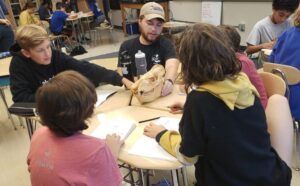Outreach Programs (ON HOLD)
UPDATE 12/16/25: We unfortunately have to put our Outreach Programs on hold for the foreseeable future. We will reevaluate our capacity for Outreach Programs (both paid and freely provided) for Fall of 2026. Please check back on this page in late Summer 2026 for any updates. We do have a donor fund that helps us provide free field trips to local public school groups and can even cover bus fees. If you’re a local public school teacher interested in that option, please check out our Group Tours page for more details.

DLC Educator Ethan Moore introduces DPS middle schoolers to Megaladapis, an extinct giant lemur.
What? One of our professional educators will visit your classroom to engage with your students through an active, inquiry-based evolution lesson. We’ll start with showing a few key skulls from our Museum of Natural History collection, encouraging curiosity and engagement through comparing and contrasting features, then we will follow up with fascinating details in our “Primate 101” presentation, complete with adorable photos and videos of the DLC’s resident lemurs! Lemurs offer a charismatic lens through which we can explore evolution, adaptation, and animal classification, and we have four tailored presentations designed to align with the NCDPI 2023 K-12 Science Standards for grades 3-4, grades 5-6, grades 7-8, and grades 9-12 (specific standards listed below). We anticipate these programs lasting 40-60 minutes, depending on student age and engagement level. We love inquiry-based learning, so our educators will welcome questions, and we are happy to adjust our approach based on your students’ interests and personalities. While we can’t bring any live lemurs along for the program, we can tailor the biofacts we bring to your students’ interests. At this time, our in-person outreach programs are limited to schools within a 30-minute drive of the Duke Lemur Center, but we may consider slightly longer distances if we can work with several classrooms in the same day.
What about virtual options? We can also offer a virtual version of this program, using images and videos to walk through the activities and presentation with your students from afar!
When? Classroom programs are typically offered on Tuesdays, Wednesdays, or Thursdays, based on our staff’s availability. We may be able to accommodate other days, so it never hurts to ask!
How? You can request your classroom program by emailing primate@duke.edu with the following information:
1. School name
2. Grade level
3. Number of students
4. A few proposed dates (Tuesdays, Wednesdays, and Thursdays preferred) and timing windows. We’re not familiar with start/end/lunch times for all schools, so specific timing windows are very helpful to ensure that we schedule at a time that works for everyone.
5. Any special requests, questions, or concerns
Once we receive your request, we will reach out within 72 hours to discuss scheduling. Because this program is free to Title I school educators and students, the only limiting factor is our staff’s time. We hope to accommodate all requests, but please note that we will prioritize Title I schools.
Outreach Programs FAQ
What is “Primate 101” about? This lesson will look at topics like evolution and adaptation-examining the characteristics that primates share, and then dive a little deeper to distinguish between different types of primates, highlighting lemurs! If you’re curious to know more, please send us an email at primate@duke.edu.
What if my school is not Title I? While we are not able to offer free programs to non-Title I schools at this time, we are happy to consider outreach requests and discuss fees on a case-by-case basis.
Can I request a different topic or program format? Absolutely! While we may not be able to accommodate every topic you request, we will try our hardest to work with you to find the best program for your students.
What about other virtual programs? Please see our virtual programs page to find out more information on our current offerings, including a FREE 75-minute Virtual Tour video series.
NCDPI 2023 K-12 Science Standards
LS.1.1 Understand the basic needs of a variety of plants and animals in difference ecosystems
LS.2.2 Understand that organisms differ from or are similar to their parents and other offspring based on characteristics of the organism
LS.4.1 Understand the effects of environmental changes, adaptations, and behaviors to enable organisms to survive in changing habitats
ESS.4.3 Understand changes caused by human impact on the environment
LS.5.2 Understand the interdependence of plants and animals with their ecosystem
LS.5.3 Understand some characteristics of an organism are inherited and other characteristics are acquired
LS.8.2 Understand how organisms interact with and respond to the biotic and abiotic factors in their environment
LS.8.3 Understand the evolution of organisms over time based on evidence and processes
LS.Bio.10 Analyze the evolutionary relationships among organisms

